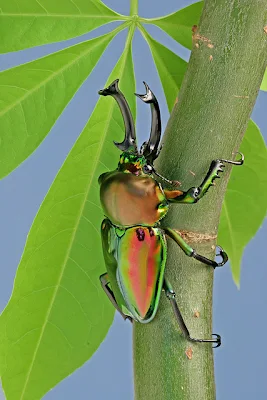 |
| Vincent Van Gogh. Wheat Field with Cypresses at the Haute Galline Near Eygalieres Saint-Rémy - June 1889 |
I also enjoy classical music, especially that of J. S. Bach, Handel, Mozart, Beethoven, Haydn, Elgar and Vaughn Williams, and could listen to the great classical guitarists like André Segovia, Julian Bream or John Williams all day long. Oh how I wish I could play half as well. Although not my favourite piece of classical music, I once totally converted a girl who worked for me to classical music by playing her Pachelbel's Canon in D.

 |
| The nave of Winchester Cathedral, England |
To me, these things debase the object of beauty. Neither of them seem to recognise the inherent beauty of the thing itself. The idea that I should regard this thing as beautiful because I've been told to, or because of who supposedly made it, rather than for what it actually is, is almost abhorrent to me. That's not to say I don't appreciate good craftsmanship of course. I love churches and cathedrals not for their function but for the craftsmanship of, very often ordinary and completely anonymous, craftsmen - the carpenters and stone masons, stained class makers and iconographers - who actually created the place.
A stooping peregrine, a tree, a hunting cheetah, a swimming seal and a diving whale are all things of great beauty and wonder to me and my wonder is no less because I understand a little of how they work and how they came to be what they are; the evolutionary forces and the balance of competition in their environment which selected those best able to compete from amongst their ancestors.
 |
| Water Lilies; Claude Monet, 1906 (Art Institute of Chicago) |
Can we analyse beauty and come up with a universal definition? The Star-spangled banner can inspire most Americans to patriotic fervour, but to a bat it's probably a cacophonous sequence of discords, and to an Englishman, just another national anthem. Beethoven's Ode to Joy is for me the essence of the EU and it stirs something in me for it. The German national anthem is still, after 60 years, a little sinister. Does 'uber ales' really mean 'above all else' or 'over everyone'...?
 |
| Audrey Hepburn |
No. We can't define or analyse beauty because it means different things to different people and probably nothing at all to another species, no matter how intelligent. To coin a cliché, beauty is in the eye (or ear) of the beholder.
So where did we get this aestheticism from?
As a materialist, and of course an evolutionist, I know that we must account for it in terms of a benefit conveyed to our ancestors from back in our history, or it is an ability which co-evolved on the back of some other evolving characteristic. Did we evolve our sense of wonder and appreciation along with our intelligence?
Did we become 'hooked' on the endorphin rush we have when we see something beautiful or relaxing? Is it part of our sex-selection where there is a clear survival advantage for our genes in selecting 'beautiful' partners because what we think of as beauty is actually an assessment of good health - symmetry, good muscle structure, curves in the right places, breasts, and yes, genitalia.
Does our appreciation of nature (does everyone have that?) convey a benefit for a hunter-gatherer because it helps us learn and understand nature, the better to find and eat it, and the better to avoid being eaten by it?
 |
| Watersmeet, Devon, England |
We know our aesthetic values are determined to a large extent by our culture and our back-ground. Would Vaughan Williams 'Lark Ascending' mean so much to a Bantu or Inuit? Why do I find the singing voice of a Bollywood actress quite unpleasant and yet it can send someone from Karela or Gujarat into raptures?
You see, even contemplating the possible reasons for our aestheticism opens up more questions and make it more wonderful for a curious mind.
 |
| Rainbow Stag Beetle, Phalacrognathus muelleri |
 |
| Christchurch College, Oxford |
Certainly, my atheism has not lessened my love of nature for the great beauty it holds; and that is not diminished in the slightest because I have tried to understand it. Quite the contrary, it has immeasurably enhanced it because the more I learn the more I realise just what a magic world in a magic universe we have the great good fortune to experience for this brief instant of intelligent life that chance has given us.
Perhaps the real beauty of the rainbow lies not in it colours, nor in the way these are split up by rain drops, nor even in the way we see and perceive them.
Perhaps the real beauty of the rainbow lies in understanding why we perceive it as beautiful in the first place.


Couple o' thingies buddy. If Gawd is responsible for all beauty, then what of NOT beauty. Can "they" just give the childish answer of Satan, pure evil, definitely not their god. second, someone should start a comprehensive list of all that "they" hijacked from the rest of the world. They have cornered the market on beauty, good deeds and love (their belief being one cannot have any of those without their specific god). I;m the kinda atheist blogger that is into the battle for secular Society (give us our public square back), but while we're at it, let's take back beauty and love...it's for everybody,
ReplyDeleteKriss
Good point, well made.
DeleteNice piece. Do you know how many popular songs are based on Pachelbel's Canon? Worth a Google. The girl who worked for you probably likes most of them without knowing why.
ReplyDeleteThanks for the spelling correction :-)
DeleteAh yes, the Pachelbel rant is well worth a watch http://www.youtube.com/watch?v=JdxkVQy7QLM
DeleteYour infantile attempt to impersonate me again has been deleted. Did you think I wouldn't notice, Manuel?
ReplyDelete